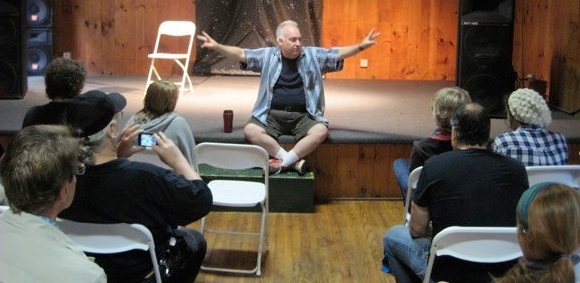My husband has been teaching a drop-in improv class in Manhattan every Wednesday night for the last 7 years.
Since it’s a drop-in class he never knows who is going to be there. Originally he assumed that his students would be young and aspiring actors wanting to sharpen their comedy chops and get some stage time. What surprised him was who started to show up:
- An Project Manager from Madison Square Gardens
- An IT consultant
- A New York City Police detective
- A surgeon from South Africa
- A Special Education Teacher from the Bronx.
I remember him coming home from one of his first classes and wondering aloud: “What in the world is attracting all of these people to improvisation?”
I knew that it was because people in business are hungry to learn how to be more spontaneous. In this tech heavy, social media world, they crave insight into how to be in-the-moment and generally are looking for places to be inspired and have fun.
There are 3 main principles that he covers in class:
- Make active positive choices
- Support the physical and verbal reality of the scene.
- It’s an actor’s job to justify
These principles have been handed down to generations of improvisors from the screenwriter Elaine May and are the heart of ‘scripting on your feet’—which is what one of our theatre colleagues liked to call the art of improvisation. Or, in business, what we sometimes call: ‘thinking outside the box’.
The principles are also the reason people keep coming back to class. We know, because students have said so:
- The Project Manager –
I need to get people on board my projects in a positive way. This class has shown me how to get staff jazzed about new ideas.”
- The Police detective –
I have to support the reality of the moment. You can’t imagine the kinds of things I’ve had to deal with on the job. I’ve learned to breathe and stay present. It calms people down. You’d be surprised.”
- The Surgeon –
When people come to me they are scared and hopeful. I have to justify to them that will be in good hands if they let me help them. I used to just tell people my credentials. Now I understand that I have to ask what’s on their minds.”
- The Special Education teacher –
My kids present different challenges every day. If I’m not in the moment dealing with their reality each day, I’m not doing my job.”
My own PRINCIPLED LEADERSHIP workshop is inspired by what I learned from my husband’s work. Savvy companies have made the connection between improvisation and improved leadership and I am often called upon to teach it to high potential individuals in Fortune 500 organizations.
If your company isn’t investing in your development in this way and you are interested in taking your own leadership to a new level I strongly recommend taking an acting or improv class. Wikipedia has a great list of Comedy and Improv Theatre companies across the US and most local colleges offer classes too.
Of course, if you are ever in Manhattan, you can drop-in to my husband’s class any Wednesday night. It starts at 6:00 pm.

















